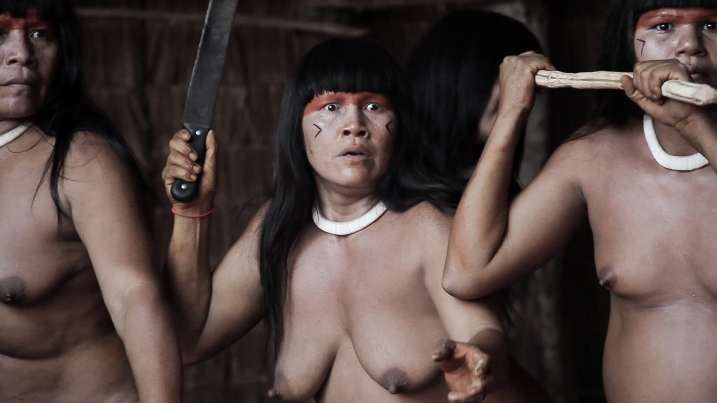Once upon a time the men of the Cuicuro tribe didn’t return to their village after they went out to fish. Thus their women started to worry and sent one of the younger boys to go and look for them. When he came back he was shocked, all the men had turned into crazy pigs. ENRAGED PIGS embodies only one of the many legends the Cuicuro are passing on orally from generation to generation. Theatre director, actress and anthropologist, ISABEL PENONI was born in Brazil, in 1979. She is founder of Cia Marginal theater ensemble in Rio de Janeiro, has directed the plays, “Qual e a nossa cara?” (2007) and “O, Lili” (2011). LEONARDO SETTE attended classes in Cuba and France and obtained a degree in Cinema History from Sorbonne. Sette’s first short film, OCIDENTE (2008) won the best film award in Rio’s Film Festival, among others. His first documentary feature, THE HYPERWOMAN (2011) had its international premiere in Rotterdam.
Ioana Mischie: The Cuicuro legends have without any doubt a captivating uniqueness. How did you discover the idea of this short film and how did you get along while directing it together?
Isabel Penoni: I had been at the main Kuikuro village in 2009 for research to my university studies in anthropology, which focused on traditional ritual performances. Back then I found many people eager to work with fiction – they were already making documentary films themselves. As I happen to be actress and theater director myself, I proposed them a project to explore fiction connecting theater and their myths and rituals. They quickly agreed and I asked to work with the women instead of the men. So we naturally picked the women’s most important myth, the Jamurikumalu (the myth of The Hyperwomen), and together started a long-term relationship to work on a theater play. Later we presented this work at the center of the village to the whole Kuikuro community.
Leonardo Sette: Isabel and I met by chance at the Kuikuro village in 2010, I had actually already been there a few times before, working to support their own filmmaking projects. I recall feeling quickly attracted to the work they were doing, Isabel and the Kuikuro women. They asked me if I could help by filming the actual presentation of the play and I promptly accepted. But I proposed to do also something else later on, at a different site and time, and that would be an actual film, with a specific cinematic outlook rather than just filming the play. Isabel replied that she always wanted to do that, she just didn’t have the means at that point, she was all by herself. The women embraced the idea and we all went to work on the film right after they were done with the play.
Ioana Mischie: The women appear not only as contemporary meta-shamans and ancient performers, but also defining their key-role in the community as links between past and future generations. Should we consider the Cuicuro women, from this perspective, role models for our contemporary societies? What captivated you the most when trying to portray them?
Leonardo Sette : I was simply very impressed by their acting, I mean, their artistic performance. I wouldn’t know what to say about them being role models to our society or to their own, to be honest, I never thought of that. I just felt they were coming up with incredibly good acting.
Isabel Penoni: What catches me the most in their performance is this sort of availability of their bodies, the spontaneity, the commitment and the faithfulness that they show through their bodies.
Ioana Mischie: How did you interact with the women of the tribe? How long and intense were the rehearsals and what unexpected events or reactions you experienced during the shooting?
Isabel Penoni : The work to create the scenes and to rehearse them was actually quite long, it took three different trips to the village between 2009 and 2010. Obviously it was a very intense experience, first because we didn’t speak the same language, then all the talking had to pass through the few Kuikuro men who do speak Portuguese. But since the first moment I felt the women were engaging to the work with little or no hesitation. The Kuikuro are a very spectacular people, I mean, in the sense that they are specialists in huge collective ritualistic performances, and the women that I worked with are established traditional dancers and singers. I think this helps to explain the familiarity they showed towards the artistic working process I proposed.
Leonardo Sette: Quite the opposite, the work on the film was quick and short. There wasn’t actually much to be done, it was more a matter of avoiding silly temptations and doing the good choices rather than throwing new fancy ideas into it. The women also had their own other activities to do and couldn’t commit more than a couple of days for the shooting. So we basically worked fast, guided by instinct and by the feeling that things should stay simple and mysterious.
Ioana Mischie: The story initially happening in a closed environment is driven forward by dancing movements of the human body, until everything has to evade and face the objective world. The initial micro-universe becomes a macro-contemplation. Did you script the entire evolution of the film or it was as well based on improvisation?
Isabel Penoni:- The script for the play was based on the oral story-telling of the mythical origin of Jamurikumalu (The Hyperwomen). This narrative sequence was indeed very well prepared and designed in advance for the directing and acting of the play.
Leonardo Sette: We then started from a work that was already very rich and complete. Yet a few new things were added on the set itself or during the editing, such as the closing shots that connect interior to exterior. We also cut off a few scenes and changed the order of another when we agreed it was better for the film. We were definitely no longer thinking about theater in any way. But I wouldn’t call it improvisation though, as much as I like the word and the idea of improvising.
Ioana Mischie: Because the short film seems to have as well a profound antropologic component, how do you perceive the connection between antropology and cinema?
Isabel Penoni: We didn’t intend to have any anthropological layer in the film. Maybe this is more up to some of the spectators’ views than to our own. Sure we both have some knowledge of that culture, the Kuikuro I mean. As I said, I did my masters research in anthropology there, it was about traditional rituals, and Leo had been involved for many years in a project that supports the Kuikuro’s own wish to produce media themselves. But we really didn’t care much about that, first it was a theater play, than it was a film, we just wanted it to be artistically strong and meaningful.
Ioana Mischie: What was the reaction and the feedback of the Cuicuro women after watching the film?
Isabel Penoni: It has obviously been shown at the village, but we haven’t yet had the chance to meet them personally to hear their comments.
Leonardo Sette: We have learned through others from the Kuikuro village that the women approved it – we had to do a legal contract with them and the Kuikuro in order to distribute the film. We have also been told that some elders got a bit emotional about it in a good way, feeling connected to it. So I believe we could say they are proud of it, I just don’t feel comfortable to speak in their place.
More about ENRAGED PIGS.


